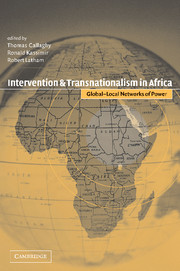Book contents
- Frontmatter
- Contents
- List of contributors
- Preface
- List of abbreviations
- 1 Introduction: transboundary formations, intervention, order, and authority
- Part I Historical dimensions and intellectual context
- Part II Theoretical frameworks
- Part III Transboundary networks, international institutions, states, and civil societies
- 6 Networks and governance in Africa: innovation in the debt regime
- 7 When networks blind: human rights and politics in Kenya
- 8 Global, state, and local intersections: power, authority, and conflict in the Niger Delta oil communities
- Part IV Political economies of violence and authority
- Part V Conclusion
- References
- Index
8 - Global, state, and local intersections: power, authority, and conflict in the Niger Delta oil communities
Published online by Cambridge University Press: 18 December 2009
- Frontmatter
- Contents
- List of contributors
- Preface
- List of abbreviations
- 1 Introduction: transboundary formations, intervention, order, and authority
- Part I Historical dimensions and intellectual context
- Part II Theoretical frameworks
- Part III Transboundary networks, international institutions, states, and civil societies
- 6 Networks and governance in Africa: innovation in the debt regime
- 7 When networks blind: human rights and politics in Kenya
- 8 Global, state, and local intersections: power, authority, and conflict in the Niger Delta oil communities
- Part IV Political economies of violence and authority
- Part V Conclusion
- References
- Index
Summary
Introduction
This chapter analyzes how transboundary formations are reflected in the conflicts ravaging the highly volatile and militarized Niger Delta oil communities. It inquires into the effects and forms of international intervention, of local co-opting of discourses in international arenas, and state mediation of global and local forces. This is an important step towards explaining how the dialectics of international interventionism and local governance fuel conflict in the Delta.
The conflict in the Niger Delta provides a concrete case of transboundary formations as they emerge in points of conflict and alliance. This complex terrain of conflict and social coalitions needs to be systematically “unpacked.” Such unpacking will help us interrogate some zero-sum assumptions about the impact of globalization on the state as well as on local conflict in Africa.
In relation to the ongoing struggles in the Niger Delta, it is possible to discern the role of four major actors/forces: the multinational oil corporations (MNOCs); the Nigerian state; local leaders, organizations, and movements; and international non-governmental organizations (INGOs). With the exception of the MNOCs and, to a lesser extent, the INGOs, these actors, particularly the state and local leaders and movements are fractionated, and form alliances that are as complex as they are contradictory. The reasons for this lie in a host of historical, cultural, economic, and political factors.
- Type
- Chapter
- Information
- Intervention and Transnationalism in AfricaGlobal-Local Networks of Power, pp. 173 - 194Publisher: Cambridge University PressPrint publication year: 2001
- 15
- Cited by



